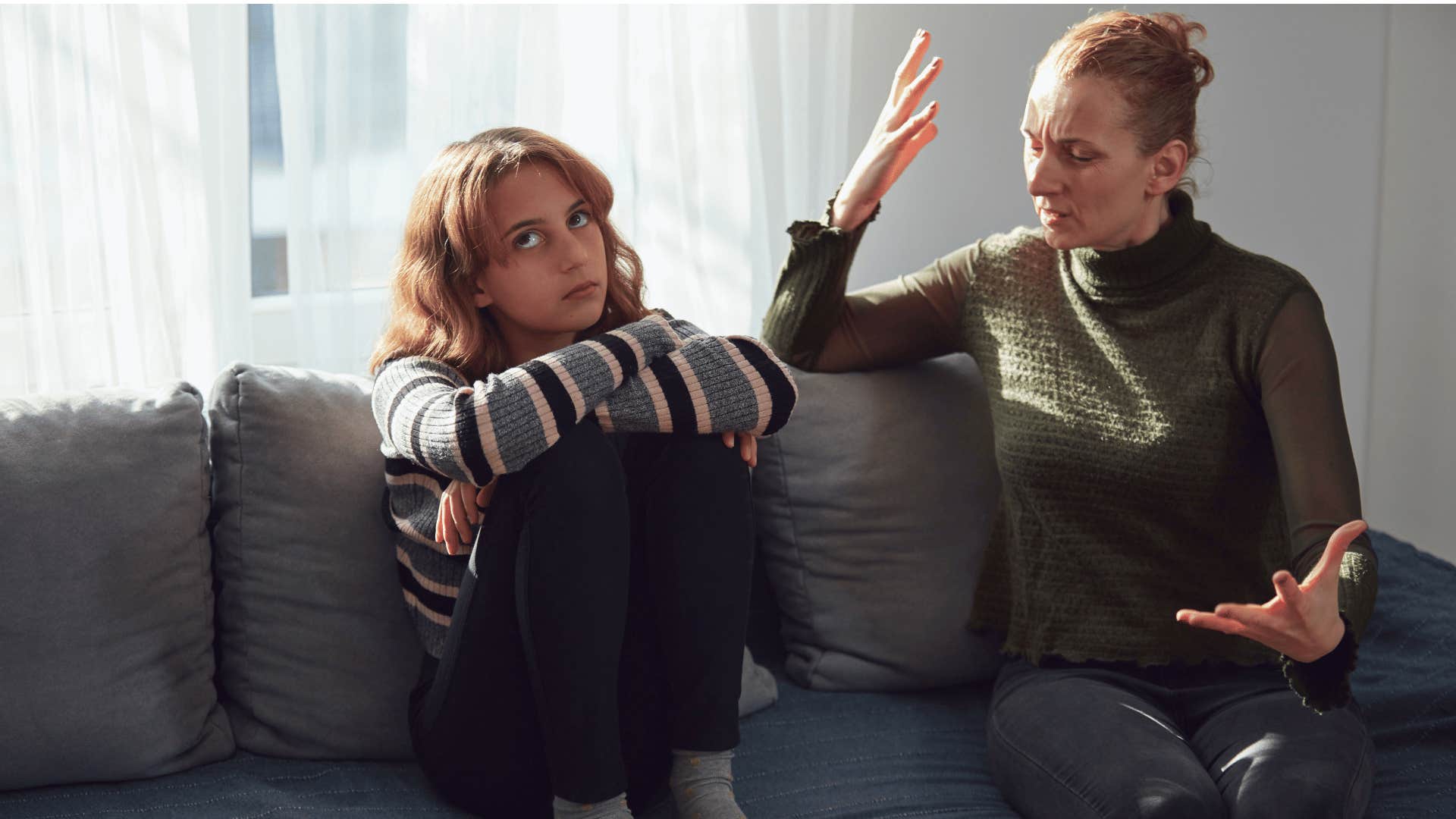11 Traits Of Parents Whose Adult Kids Often Resent Them Once They Grow Up
Resentment grows slowly and is difficult to move past.
 Jenoche / Shutterstock
Jenoche / Shutterstock Many people would like to naively believe that everyone has a great relationship with their parents. However, according to Pew Research Center, it's estimated that 18% of young adults decidedly do not. For parents who possess certain unfortunate traits, it's particularly likely that their adult kids will resent them once they grow up.
Conversations around boundary setting, childhood trauma, and toxic parental behavior are crucial for parents who want to nip future resentment in the bud and ensure they maintain a close bond with their children even after they've grown up and moved out.
Here are 11 traits of parents whose adult kids often resent them once they grow up
1. They refuse to respect their kids boundaries
 Mortion Films | Shutterstock
Mortion Films | Shutterstock
The first trait of parents whose adult kids often resent them once they grow up is their refusal to respect their kids' boundaries. Setting boundaries and drawing lines will always be uncomfortable. That said, healthy parents respect their kid's boundaries and do their utmost to uphold them, even at the expense of their own discomfort.
Psychotherapist Sean Grover L.C.S.W., explains that kids whose parents don't respect their boundaries feel tremendous guilt when they try to enforce them as adults.
2. They gaslight their kids into believing that they’re the ones at fault
 NTshutterth | Shutterstock
NTshutterth | Shutterstock
There's nothing more heartwrenching than a parent who tries to gaslight their kids into believing that they're the ones at fault. Not only does it lead to feelings of hurt and anger in these children, but it can also have devastating consequences later down the road.
According to clinical psychologist Daniel S. Lobel Ph.D., gaslighting causes kids to be more confused than regular adults as their brain isn't fully developed. He added that factors like this make the betrayal that much worse, leading to long-lasting issues with intimacy and trust.
RELATED: Parents Don’t Realize These 10 Behaviors Sabotage Their Relationships With Their Adult Kids
3. They don’t apologize when they’re clearly in the wrong
 Krakenimages.com | Shutterstock
Krakenimages.com | Shutterstock
Parents who refuse to take accountability for their actions should remember that actions have consequences. According to a 2014 study, refusing to take accountability results in children who feel insecure and unworthy in adulthood.
As a result, these intense emotions slowly begin to drain them as they eventually cut ties and have no contact with their parents. After all, why would adult kids continue to try when a parent can't even admit to their wrongdoings? Combine this with the fact that these kids always had to beg and apologize for actions that weren't their fault, and is it any wonder why adult kids often resent them once they grow up?
4. They use humiliation as a form of discipline
 fizkes | Shutterstock
fizkes | Shutterstock
There's nothing more demeaning than a parent who humiliates their children as a form of punishment. According to child development expert Marlena Romero, LCSW, public shaming, whether online or in person, is bound to be damaging to children.
She noted that embarrassing comments made by parents can turn into a self-fulfilling prophecy that results in children believing whatever negative qualities their parents associated them with.
Whether parents like it or not, negative comments thrown in the middle of a grocery store can absolutely damage their kid's self-esteem. As a result, adult kids often resent them once they grow up, feeling dehumanized and belittled in the presence of their parents.
5. They coddle their kids and allow them very little freedom
 fizkes | Shutterstock
fizkes | Shutterstock
Whether it's getting dressed in the morning by themselves or going out to a party, every child desires the freedom to live their life with little interference from their parents. That said, parents who coddle their kids raise them to be adult kids who often resent them once they grow up.
Feeling like they're being tied down these kids slowly feel frustrated with their parent's lack of respect. A study published in 2021, found that encouraging children's independence leads to higher motivation, confidence, and self-esteem. This is because children know that whatever problems life throws their way they'll be able to handle them without needing to depend on others.
As a result, these kids feel equipped and prepared to enter the real world, which in turn, strengthens the bond they have with their parents.
6. They’re closed-minded and dismiss their kids opinions
 KucherAV | Shutterstock
KucherAV | Shutterstock
Most people know that open communication is the building block to healthy relationships, and parent-child relationships are no exception. Not only does open communication prevent misunderstandings, but it can also deepen bonds as trust between parent and child begins to flourish.
Furthermore, it provides children with an opportunity to open up about their trauma with zero judgment from their caregivers. However, what happens when a child doesn’t have that healthy support system with their parent? How is their communication impacted?
According to a study in 2022, children with childhood trauma who have received mistreatment from their parents found it harder to communicate. Not being able to feel safe around their parents puts a strain on their relationship. Because of this, that heavy strain becomes a burden that slowly develops into resentment as adult kids made the difficult decision to cut their parents off from their lives completely.
7. They burden their kids with unrealistic expectations
 AstroStar | Shutterstock
AstroStar | Shutterstock
Many overly critical parents have deep-rooted insecurity and as a result, continuously demand perfection from their kids. Feeling deeply embarrassed by their own life failures in life, toxic parents will load on expectation after expectation, with little regard for their kid's mental well-being.
However, parental expectation isn’t uncommon; in fact, the effects of it are well known. A study published in the American Psychological Association analyzed data from over 20,000 Americans and Canadians. Researchers found that young people’s perception of their parent's expectations and criticism has increased over the past 32 years. The researchers note that perfectionism often leads to depression, anxiety, and other mental health problems.
8. They created a fear based environment
 Wasana Kunpol | Shutterstock
Wasana Kunpol | Shutterstock
Many toxic parents create an environment based on fear and submission. Traumatized by their own upbringing, these parents will use downright frightening methods to keep their kids in line.
Most parents discipline their kids out of fear that their kids will make the same mistakes they did. But unfortunately, their behavior doesn’t translate well, as most kids are left feeling unloved and emotionally abandoned. As a result of their parent's abandonment, kids become adult kids who often resent them as they grow older.
This type of behavior isn’t uncommon; in fact, the World Health Organization estimated that 60% of children regularly suffer from physical punishment by a parent or caregiver.
9. They used their financial power to control their kids
 Dobo Kristian | Shutterstock
Dobo Kristian | Shutterstock
Financial control is no joke. According to BMC Public Health, multiple studies have found that economic abuse is linked to a range of negative outcomes, some of which include a decrease in mental and physical health, financial impacts, and a decrease in parent-child interactions.
That said, toxic parents may not realize how their financially controlling ways impact their kids for the worse. These parents may assume that it’s normal to use finances to keep children in line or punish them if they misbehave. However, this type of behavior had devastating consequences.
In turn, adult kids who didn’t get their needs met growing up are less likely to offer that same support back to their parents, leading to a closed-off relationship on all fronts.
10. They treat love as conditional
 fizkes | Shutterstock
fizkes | Shutterstock
Every kid needs unconditional love from their parents. According to a 2013 study from UCLA, unconditional love from a parent helps children feel less anxious and more happy.
But instead of parents opening themselves up and actively showing their child affection, many toxic parents resort to petty means of withholding affection to get even. This hurtful action, unfortunately, leads to communication decreasing as adult kids grow to resent their parent's hot and cold nature.
As a result, this isolates both parties and sparks the experience of having no contact with a parent, continuing the cycle of toxic familial relationships.
11. They minimize their kids success
 Perfect Wave | Shuttetstock
Perfect Wave | Shuttetstock
Many older people, including parents with adult children, struggle to congratulate their children for their success. Feeling jealous and insecure these parents will either choose to ignore their adult kids' success or sabotage their success completely.
However, jealousy from parents isn’t uncommon as psychotherapist Annie Wright, LMFT, explained that feeling jealous can be normal and natural, especially when comparing it to their own upbringing. Of course, this doesn’t excuse parents who engage in toxic behaviors for their own benefit.
After all, healthy parents who feel jealous will always find healthier outlets to release negative emotions rather than pilling them onto their children.
Marielisa Reyes is a writer with a bachelor's degree in psychology who covers self-help topics such as relationships, career, family, and astrology.

